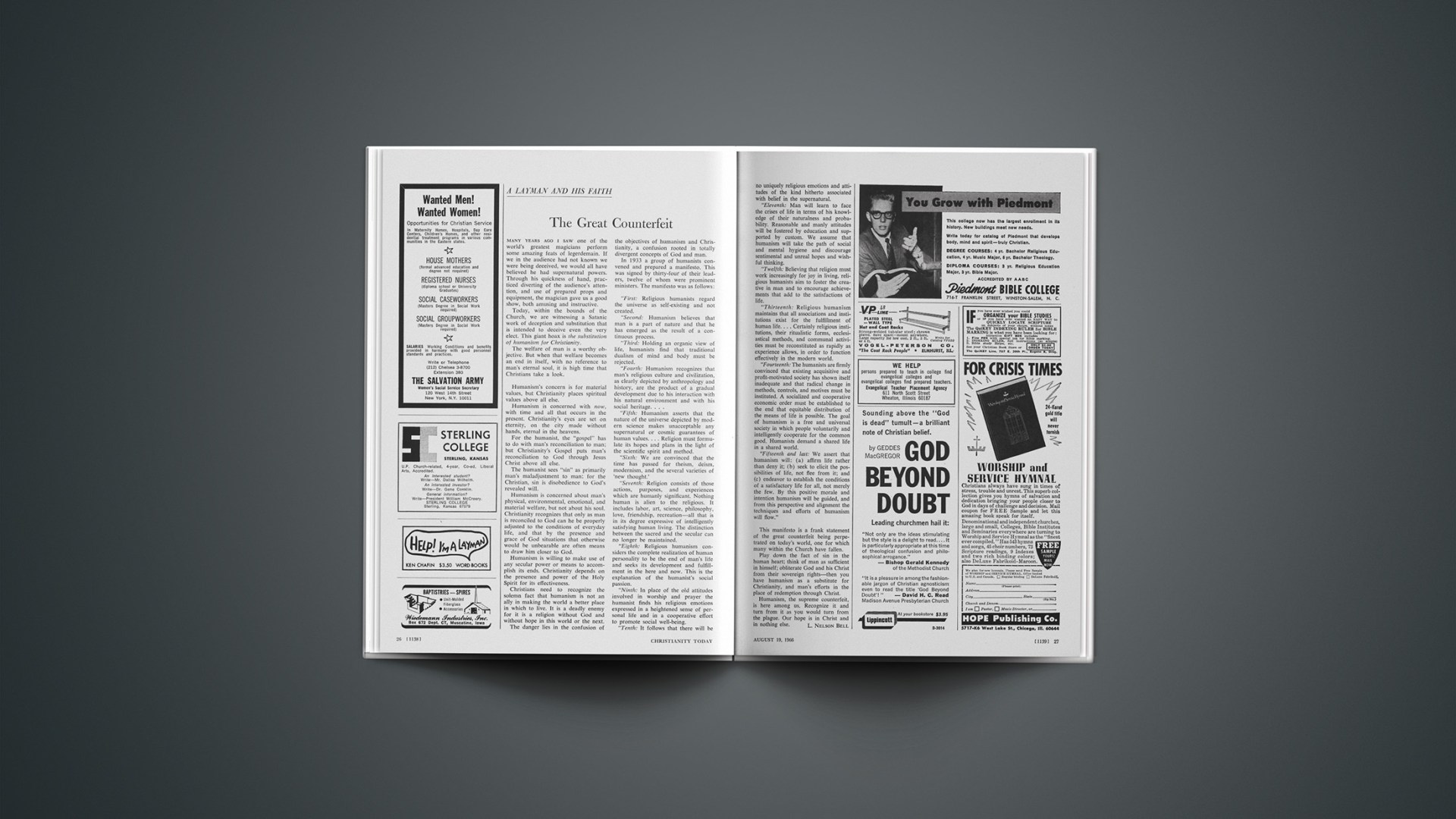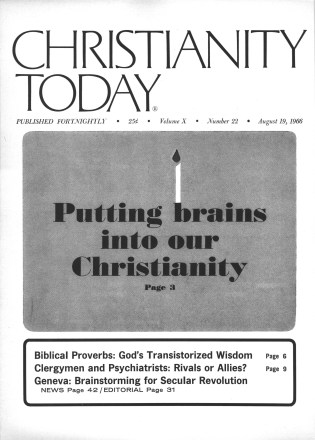Many years ago i saw one of the world’s greatest magicians perform some amazing feats of legerdemain. If we in the audience had not known we were being deceived, we would all have believed he had supernatural powers. Through his quickness of hand, practiced diverting of the audience’s attention, and use of prepared props and equipment, the magician gave us a good show, both amusing and instructive.
Today, within the bounds of the Church, we are witnessing a Satanic work of deception and substitution that is intended to deceive even the very elect. This giant hoax is the substitution of humanism for Christianity.
The welfare of man is a worthy objective. But when that welfare becomes an end in itself, with no reference to man’s eternal soul, it is high time that Christians take a look.
Humanism’s concern is for material values, but Christianity places spiritual values above all else.
Humanism is concerned with now, with time and all that occurs in the present. Christianity’s eyes are set on eternity, on the city made without hands, eternal in the heavens.
For the humanist, the “gospel” has to do with man’s reconciliation to man; but Christianity’s Gospel puts man’s reconciliation to God through Jesus Christ above all else.
The humanist sees “sin” as primarily man’s maladjustment to man; for the Christian, sin is disobedience to God’s revealed will.
Humanism is concerned about man’s physical, environmental, emotional, and material welfare, but not about his soul. Christianity recognizes that only as man is reconciled to God can he be properly adjusted to the conditions of everyday life, and that by the presence and grace of God situations that otherwise would be unbearable are often means to draw him closer to God.
Humanism is willing to make use of any secular power or means to accomplish its ends. Christianity depends on the presence and power of the Holy Spirit for its effectiveness.
Christians need to recognize the solemn fact that humanism is not an ally in making the world a better place in which to live. It is a deadly enemy for it is a religion without God and without hope in this world or the next.
The danger lies in the confusion of the objectives of humanism and Christianity, a confusion rooted in totally divergent concepts of God and man.
In 1933 a group of humanists convened and prepared a manifesto. This was signed by thirty-four of their leaders, twelve of whom were prominent ministers. The manifesto was as follows:
“First: Religious humanists regard the universe as self-existing and not created.
“Second: Humanism believes that man is a part of nature and that he has emerged as the result of a continuous process.
“Third: Holding an organic view of life, humanists find that traditional dualism of mind and body must be rejected.
“Fourth: Humanism recognizes that man’s religious culture and civilization, as clearly depicted by anthropology and history, are the product of a gradual development due to his interaction with his natural environment and with his social heritage.…
“Fifth: Humanism asserts that the nature of the universe depicted by modern science makes unacceptable any supernatural or cosmic guarantees of human values.… Religion must formulate its hopes and plans in the light of the scientific spirit and method.
“Sixth: We are convinced that the time has passed for theism, deism, modernism, and the several varieties of ‘new thought.’
“Seventh: Religion consists of those actions, purposes, and experiences which are humanly significant. Nothing human is alien to the religious. It includes labor, art, science, philosophy, love, friendship, recreation—all that is in its degree expressive of intelligently satisfying human living. The distinction between the sacred and the secular can no longer be maintained.
“Eighth: Religious humanism considers the complete realization of human personality to be the end of man’s life and seeks its development and fulfillment in the here and now. This is the explanation of the humanist’s social passion.
“Ninth: In place of the old attitudes involved in worship and prayer the humanist finds his religious emotions expressed in a heightened sense of personal life and in a cooperative effort to promote social well-being.
“Tenth: It follows that there will be no uniquely religious emotions and attitudes of the kind hitherto associated with belief in the supernatural.
“Eleventh: Man will learn to face the crises of life in terms of his knowledge of their naturalness and probability. Reasonable and manly attitudes will be fostered by education and supported by custom. We assume that humanism will take the path of social and mental hygiene and discourage sentimental and unreal hopes and wishful thinking.
“Twelfth: Believing that religion must work increasingly for joy in living, religious humanists aim to foster the creative in man and to encourage achievements that add to the satisfactions of life.
“Thirteenth: Religious humanism maintains that all associations and institutions exist for the fulfillment of human life.… Certainly religious institutions, their ritualistic forms, ecclesiastical methods, and communal activities must be reconstituted as rapidly as experience allows, in order to function effectively in the modern world.
“Fourteenth: The humanists are firmly convinced that existing acquisitive and profit-motivated society has shown itself inadequate and that radical change in methods, controls, and motives must be instituted. A socialized and cooperative economic order must be established to the end that equitable distribution of the means of life is possible. The goal of humanism is a free and universal society in which people voluntarily and intelligently cooperate for the common good. Humanists demand a shared life in a shared world.
“Fifteenth and last: We assert that humanism will: (a) affirm life rather than deny it; (b) seek to elicit the possibilities of life, not flee from it; and (c) endeavor to establish the conditions of a satisfactory life for all, not merely the few. By this positive morale and intention humanism will be guided, and from this perspective and alignment the techniques and efforts of humanism will flow.”
This manifesto is a frank statement of the great counterfeit being perpetrated on today’s world, one for which many within the Church have fallen.
Play down the fact of sin in the human heart; think of man as sufficient in himself; obliterate God and his Christ from their sovereign rights—then you have humanism as a substitute for Christianity, and man’s efforts in the place of redemption through Christ.
Humanism, the supreme counterfeit, is here among us. Recognize it and turn from it as you would turn from the plague. Our hope is in Christ and in nothing else.










